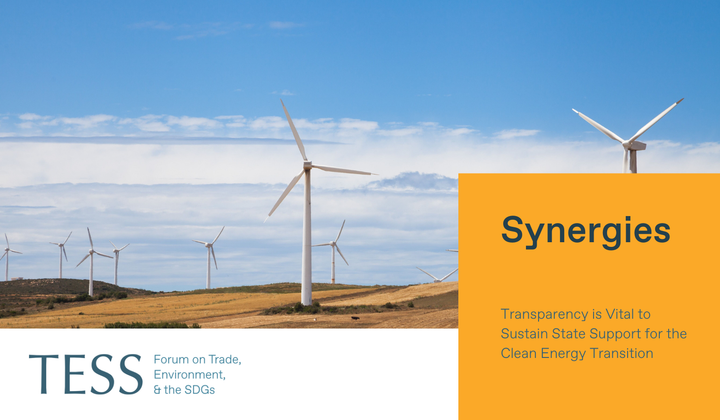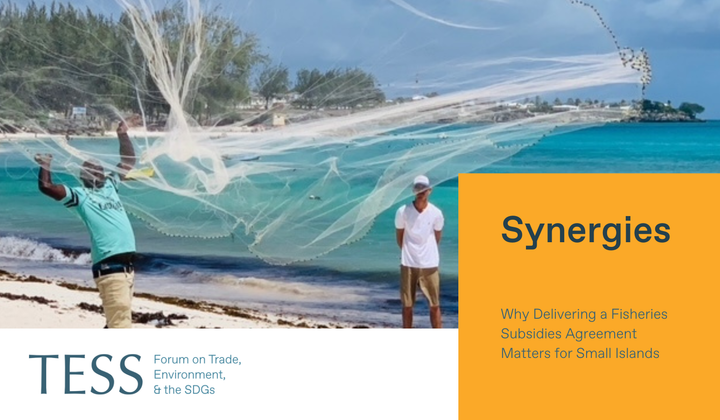A fundamental regearing of World Trade Organization subsidy rules offers the potential for transformative change—not only for the trade system but for multilateral cooperation more generally and progress on climate change and other sustainability challenges specifically.
This article is part of a Synergies series on reviving multilateralism curated by TESS titled From Vision to Action on Trade and Sustainability at the WTO. Any views and opinions expressed are those of the author(s) and do not necessarily reflect those of TESS or any of its partner organizations or funders.
-----
Governments across the world spend more than $7 trillion annually on subsidies for fossil fuels, agriculture, and fisheries according to a recent World Bank report. Much of this support is economically inefficient, trade distorting, and actively exacerbates the global environmental and climate crises.
At the same time, at the UN Climate Change Conference (COP28) in Dubai in December 2023, governments struggled to come up with $800 million in commitments to a “loss and damage” fund and a few billion dollars for other critical climate protection investments including clean energy projects. In the meantime, a handful of governments—notably the United States, European Union, China, India, Japan, and South Korea—spend orders of magnitude more each year on harmful subsidies.
But imagine if governments were to repurpose this spending to support the transition towards a low-carbon and nature-positive future economy. What if, instead of subsidizing fossil fuels, governments shifted their funding to programmes that promote clean and renewable energy? And what if they repurposed their current agricultural subsidies (which too often promote expanded crop production without regard to environmental impacts) for nutrition enhancement, assistance for farmers shifting to sustainable agriculture, and nature-based carbon capture?
The Push for Subsidies Reform
In providing its members with a forum for negotiations, the World Trade Organization (WTO) is particularly well positioned to take the lead in advancing fundamental subsidies reform. First, it has an existing framework of subsidies rules, which provides a base on which to build a new global policy framework. Second, a sustainability-driven reform effort would reinvigorate the WTO’s original 1994 Marrakesh Agreement mandate, which made clear that trade liberalization should not be understood as an end unto itself but rather a means to the end of sustainable development and a world in which all people can thrive.
A push for subsidies reform aligns with the vision of WTO Director General Ngozi Okonjo-Iweala to modernize the international trade system for the 21st century. During the recent WTO Ministerial Conference (MC13), Dr. Ngozi reiterated the pivotal role of trade in addressing national and global priorities, including the UN Sustainable Development Goals and environmental conservation. She emphasized this at COP28, highlighting trade's potential in climate change mitigation and urging governments to distinguish between “the good subsidies they need to fight the climate crisis and the bad ones that are increasing greenhouse gas emissions.” Notably, her statements came at a significant juncture: COP28 marked the first climate summit featuring a “Trade Day” organized by the UAE government, acknowledging trade policy as a potential climate solution.
Despite these efforts, the WTO faces challenges in fulfilling its mandate, evident in the limited outcomes of MC13. Discussions on trade and sustainability, fisheries subsidies, and agriculture yielded no substantial progress. From a sustainability perspective, MC13 represents a missed opportunity. Yet the WTO continues to be the best-positioned forum to engage in trade and sustainability discussions and to change the misalignment of resources that the existing multilateral subsidies rules allow.
The WTO continues to be the best-positioned forum to engage in trade and sustainability discussions and to change the misalignment of resources that the existing multilateral subsidies rules allow.
A New Subsidy Framework
Indeed, the existing subsidy structure is out of date and misaligned with today’s sustainability imperative. Current rules regulating subsidies at the multilateral level do not account for implicit subsidies, which arise when the ultimate price of a product does not account for the negative externalities associated with it. They do not apply to many forms of harmful subsidies. And they focus the WTO’s review narrowly on whether a subsidy distorts trade and not on whether the government funding promotes sustainable development. At the same time, a fundamental regearing of the WTO subsidy rules offers the potential for transformative change—not only for the trade system but for multilateral cooperation more generally and progress on climate change and other sustainability challenges specifically.
Simply put, the international community needs a new subsidy framework, which would be at once in line with the original Bretton Woods trade system vision (which gave national governments great flexibility to pursue their own domestic political agendas) and the urgent need for the WTO to support national efforts to ramp up the response to climate change and deliver on the UN Sustainable Development Goals.
The international community needs a new subsidy framework, which would be at once in line with the original Bretton Woods trade system vision and the urgent need for the WTO to support national efforts to ramp up the response to climate change and deliver on the UN Sustainable Development Goals.
Such a reform would re-focus WTO subsidies rules on the purpose of government funding and whether the impact of this support is sustainability-positive or -negative, rather than only looking at its impact on trade. To this end, our new framework for analysis yields a two-by-two matrix, whereby all subsidies are assessed on a spectrum across two key variables: sustainability impacts and trade distortions
The green box encompasses subsidies with positive sustainability impacts and minimal trade distortions, intended to encourage sustainable development without hindering international trade. These subsidies should always be allowed, incentivizing governments to invest in sectors contributing to sustainable development. Subsidies that fall under the yellow box yield substantial sustainability gains but also notable trade distortions. They are granted a presumption of WTO rules consistency, subject to factors ensuring transparency, effectiveness in sustainability, absence of trade barriers, and proportionality. The red box includes all those subsidies that produce negative sustainability impacts without significant trade distortions. They are presumed inconsistent with WTO law, unless justified by overriding trade principles or domestic priorities, subject to a proportionality test. Finally, subsidies falling into the double red box cause both negative sustainability impacts and significant trade distortions. They are proposed for outright prohibition, with WTO members required to phase them out on a fixed schedule that reflects each country’s level of economic development. A safety valve allows countries to delay phase out by contributing to a Global Sustainability Transition Fund, aiming to provide financial assistance to developing nations for transitioning industries towards sustainability.
Once established, this new regime would empower the WTO to come down hard on fossil fuel subsidies as well as ecologically damaging agricultural or fisheries subsidies. This refocusing would encourage countries to shift their funding towards initiatives that advance renewable energy, a vibrant blue ocean economy, and sustainable agriculture.
Once established, this new regime would empower the WTO to come down hard on fossil fuel subsidies as well as ecologically damaging agricultural or fisheries subsidies.
Appetite for Change
Some elements of what a new subsidy framework might include have been spelled out in our recent Journal of International Economic Law article and in the Villars Framework for a Sustainable Trade System, which was produced by a network or researchers and policymakers operating under the banner of the Remaking Trade Project. Many of the details, however, remain to be worked out. But the opportunity is clear and the appetite for transformational change within the trade system is greater today than at any point in recent decades. Thus, while MC13 produced minimal gains, the trade community should redouble their efforts to re-align the rules of global commerce with the WTO’s sustainable development mandate under 1994 Marrakesh Agreement.
Some old trade hands might ask, why now? But the answer is simple: better late than never. Across the world, citizens have signaled their interest in a transformed world that eliminates harmful subsidies, requires businesses to operate sustainably, and ensures a climate-safe future. Failing to step up to this urgent action item and the 21st century’s sustainability imperative more generally puts the future of the entire multilateral rules-based trade system at risk.
-----
Dan Esty is the Hillhouse Professor of Environmental Law and Policy at Yale University. His 1994 book, Greening the GATT, helped to spur interest in the trade-environment interface. He is a co-lead of the Remaking Trade Project and he spent 2022–23 on public service leave from Yale at the World Trade Organization in Geneva.
Elena Cima is Lecturer in Law at the University of Geneva and a contributor to the Remaking Trade Project.
-----
Synergies by TESS is a blog dedicated to promoting inclusive policy dialogue at the intersection of trade, environment, and sustainable development, drawing on perspectives from a range of experts from around the globe. The editor is Fabrice Lehmann.
Disclaimer
Any views and opinions expressed on Synergies are those of the author(s) and do not necessarily reflect those of TESS or any of its partner organizations or funders.
License
All of the content on Synergies is licensed under a Creative Commons Attribution-NonCommercial-ShareAlike 4.0 International (CC BY-NC-SA 4.0)
license. This means you are welcome to adapt, copy, and share it on your platforms with attribution to the source and author(s), but not for commercial purposes. You must also share it under the same CC BY-NC-SA 4.0 license.
If you would like to reuse any material published here or if you have any other question related to Synergies, send an email to fabrice.lehmann@graduateinstitute.ch.






